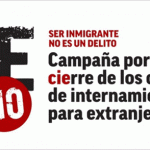On the occasion of the extraordinary Justice and Home Affairs Council meeting, Platform for International Cooperation on Undocumented Migrants (PICUM) and its member organisations, among which Pro Igual, urge EU leaders to establish safe and regular channels for migrants and refugees to come to Europe.
2015 has seen record numbers of migrants risking their lives trying to enter Europe, leading to continuous tragedies both at sea and land borders. Yet PICUM underlines that the subsequent humanitarian crisis unfolding in many countries of Europe is the result of policies aiming to deter migrants and refugees over the past 15 years. According to the Migrant Files*, over 30,000 refugees and migrants have died since 2000 attempting to reach or stay in Europe. EU migration policies during this time period have limited and in several cases even blocked migrants from arriving in regular manners to seek protection and better living conditions.
The EU Migration Agenda**, unveiled by the European Commission in May 2015, presents no significant shift in this discourse. The security agenda prevails and human mobility continues to be seen as a threat rather than an opportunity. For nearly two decades, a security focus to migration has resulted in major efforts towards securing EU external borders, the creation and maintenance of detention facilities, and efforts to criminalise and define unwanted human mobility. Focus has also increasingly been shifted on blaming smugglers who – in the absence of official and safe channels – often offer the only possible route to Europe for migrants and refugees.
While tragedies continue to unfold on a daily basis, the lack of a realistic debate on migration will have long-term impacts on the EU. What is at stake is not only the obligation to safeguard EU values and core principles based on respect for human rights, but also the manifest need for migrant workforce in many EU countries in the coming decades. According to the OECD***, the working age population in Europe will shrink by 50 million by 2060. Already today, various sectors of the economy – particularly those in low-wage occupations – rely on the presence of migrant workforce.
Nonetheless, national and European Union migration policies offer few possibilities for migrant workers from outside the EU to receive work and residence permits. Migrants are therefore pushed into the informal labour market and into an irregular situation. The recently adopted directive on seasonal work**** has been an opportunity for EU policymakers to develop regular channels for low-wage migrant workers in one sector. This has been just one step and many more efforts will be needed in the coming years to address the unrecognised labour market needs in the EU.
Aside from immediate actions that need to be taken to stop victimisation and criminalisation of migrants and refugees who have reached Europe, there is an urgent need for strong leadership in shifting the approach to migration as a whole. Without an evidence-based reform involving not only migration but social, health and labour market policies, more lives will be lost and more suffering will be inflicted. It is painstakingly clear that the current approach the EU has taken on migration is not only failing individual migrants and refugees but our societies as a whole.
PICUM and its members will aim to hold EU governments accountable to establish a new approach, moving away from securisation and criminalising migrants towards a human rights based, social and economic perspective, including more regular channels for refugees and migrants to reach Europe safely.
The statement is also available online in French, German, Italian, Spanish and Greek.

 Posted in
Posted in  Tags:
Tags: 

